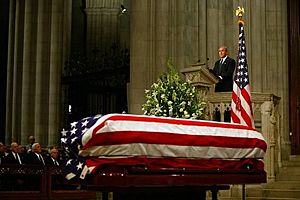Eulogy facts for kids
A eulogy (say: YOO-luh-jee) is a special speech or piece of writing that praises a person or even a thing. It's usually given to honor someone who has recently died or retired. Eulogies are often shared during funeral services, but they can also be part of other special events. The word "eulogy" comes from an ancient Greek word meaning "praise."
Contents
What is a Eulogy?
A eulogy is a way to celebrate someone's life and remember the good things they did. It's not just about saying goodbye; it's about sharing positive memories, stories, and the impact that person had on others. Think of it as a verbal hug for the person who is gone or moving on, and a way to comfort those who miss them.
Why Do People Give Eulogies?
People give eulogies for several important reasons:
- To honor the person: It's a chance to highlight their achievements, qualities, and what made them special.
- To share memories: Stories and anecdotes help everyone remember the person and often bring comfort or even a smile.
- To offer comfort: Hearing about the person's positive impact can help friends and family feel better during a sad time.
- To say goodbye: It provides a moment for people to reflect and find closure.
When Are Eulogies Given?
Eulogies are most commonly heard at:
- Funeral services: This is the most common place, where family and friends gather to remember someone who has passed away.
- Memorial services: Similar to funerals, these services also honor the deceased, sometimes held later or in a different location.
- Retirement parties: When someone finishes their career, a eulogy (or a similar speech of praise) celebrates their work and contributions.
- Special events: Sometimes, a eulogy might be given for a living person at an award ceremony or a special anniversary to recognize their achievements.
Who Gives a Eulogy?
Many different people might give a eulogy, depending on the situation:
- Family members: Often, a spouse, child, sibling, or parent will share memories.
- Close friends: Someone who knew the person well and shared many experiences might speak.
- Colleagues or co-workers: If the person was important in their job or community, a colleague might talk about their professional life.
- Religious leaders: A priest, pastor, rabbi, or other spiritual leader might give a eulogy, often including spiritual reflections.
- Public figures: For very famous people, political leaders or other well-known individuals might give a eulogy, as seen with former President George W. Bush speaking about Ronald Reagan.
What Makes a Good Eulogy?
A good eulogy is thoughtful and comes from the heart. Here are some things that make a eulogy special:
- Personal stories: Sharing short, meaningful stories or funny memories helps bring the person to life for everyone listening.
- Positive focus: It highlights the person's best qualities, their kindness, their strength, or their unique personality.
- Honest and respectful: It should be true to who the person was, while always being respectful and kind.
- Clear and simple: Using language that everyone can understand makes the message more powerful.
- Not too long: A good eulogy is usually short and to the point, often lasting only a few minutes.
Famous Eulogies in History
Throughout history, many famous eulogies have been given for important figures. These speeches often become memorable because they capture the essence of the person and the feelings of a nation or community. For example, when former President Ronald Reagan passed away in 2004, many people, including then-President George W. Bush, gave eulogies remembering his life and his time as a leader. These speeches helped people reflect on his legacy and contributions to the country.
See also
In Spanish: Elogio fúnebre para niños
 | Emma Amos |
 | Edward Mitchell Bannister |
 | Larry D. Alexander |
 | Ernie Barnes |


